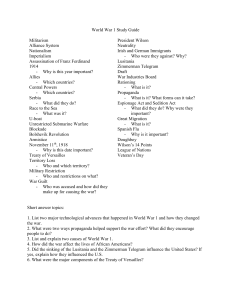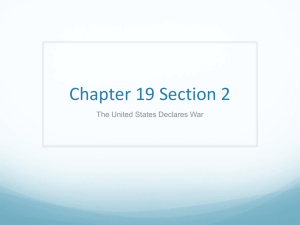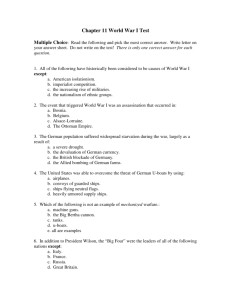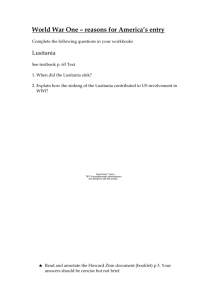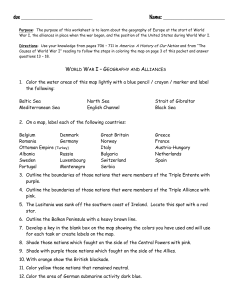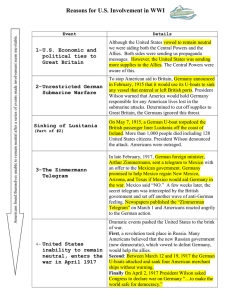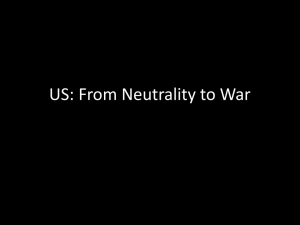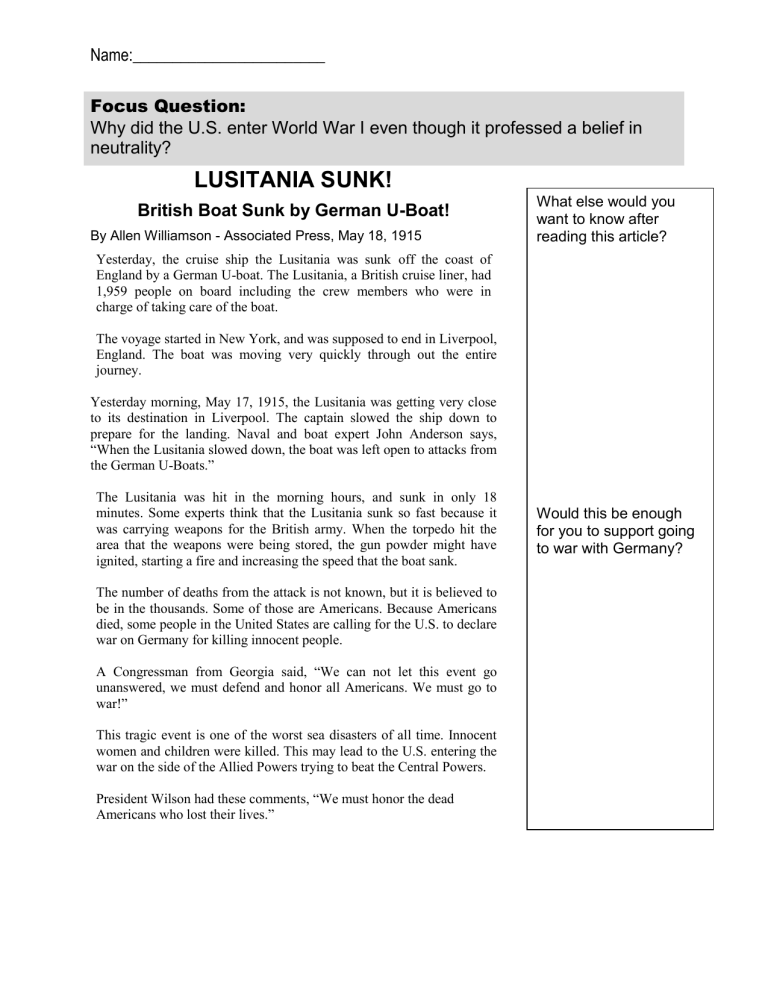
Name:________________________ Focus Question: Why did the U.S. enter World War I even though it professed a belief in neutrality? LUSITANIA SUNK! British Boat Sunk by German U-Boat! By Allen Williamson - Associated Press, May 18, 1915 What else would you want to know after reading this article? Yesterday, the cruise ship the Lusitania was sunk off the coast of England by a German U-boat. The Lusitania, a British cruise liner, had 1,959 people on board including the crew members who were in charge of taking care of the boat. The voyage started in New York, and was supposed to end in Liverpool, England. The boat was moving very quickly through out the entire journey. Yesterday morning, May 17, 1915, the Lusitania was getting very close to its destination in Liverpool. The captain slowed the ship down to prepare for the landing. Naval and boat expert John Anderson says, “When the Lusitania slowed down, the boat was left open to attacks from the German U-Boats.” The Lusitania was hit in the morning hours, and sunk in only 18 minutes. Some experts think that the Lusitania sunk so fast because it was carrying weapons for the British army. When the torpedo hit the area that the weapons were being stored, the gun powder might have ignited, starting a fire and increasing the speed that the boat sank. The number of deaths from the attack is not known, but it is believed to be in the thousands. Some of those are Americans. Because Americans died, some people in the United States are calling for the U.S. to declare war on Germany for killing innocent people. A Congressman from Georgia said, “We can not let this event go unanswered, we must defend and honor all Americans. We must go to war!” This tragic event is one of the worst sea disasters of all time. Innocent women and children were killed. This may lead to the U.S. entering the war on the side of the Allied Powers trying to beat the Central Powers. President Wilson had these comments, “We must honor the dead Americans who lost their lives.” Would this be enough for you to support going to war with Germany? Name:______________________________ Vocabulary Matching “Neutrality Gives way to War” 1. internationalism __ 2. contraband __ 3. confiscate __ 4. belligerent nation __ a. illegal goods b. a hostile country c. the belief that countries should work together d. to seize something as a punishment 5. contest the definition __ 6. blockade __ 7. conventional naval forces __ 8. declaration of war against __ 9. intercept a telegram __ country a. ships (during WWI, not submarines) b. intentionally get a telegram that you weren’t meant to read c. when a country or countries stops people & goods from going into or out of another country (because they’re at war) d. to disagree with the definition e. government’s statement of war with a Textbook section on U.S. entry into World War I (United States History, Prentice Hall [2008], pages 624-625, 627) Neutrality Gives Way to War An internationalist, President Wilson sincerely desired peace in his country and around the world. Between the start of the war in 1914 and America's entry into it in 1917, Wilson attempted to use his influence to end the conflict among the warring countries. He failed in this great effort. Ultimately, he also failed to keep the United States out of the war. Britain Blockades Germany Early in the war, British leaders decided to use their navy to blockade Germany to keep essential goods from reaching the other country. International law generally allowed contraband goods, usually defined as weapons and other articles used to fight a war, to be confiscated legally by any belligerent nation. Noncontraband goods, such as food, medical supplies, and other nonmilitary items, could not be confiscated. Britain, however, contested the definition of noncontraband articles. As the war continued, Britain expanded its definition of contraband until it encompassed virtually every product, including gasoline, cotton, and even food—in spite of international law. German Submarines Violate Neutral Rights Germany responded by attempting to blockade Britain–even though it lacked the conventional naval forces to do so. Instead, in February 1915, Germany began sinking Allied ships using its U-boats, or submarines. The reality of the German blockade struck America on May 7, 1915, when a German U-boat sank the British passenger liner Lusitania off the coast of Ireland. German officials correctly claimed that the ship was carrying ammunition and other contraband. Americans protested that an unarmed and unresisting ship should not be sunk without first being warned and provided with safety for its passengers. President Wilson was stunned but still wanted peace. "There is such a thing as a man being too proud to fight," he told his fellow citizens. "There is such a 1 2 Name:______________________________ thing as a nation being so right that it does not need to convince others by force that it is right." Germany helped to keep the United States out of the war by eventually promising not to sink any more passenger ships. But in 1916, Germany violated that promise by sinking the unarmed French passenger ship Sussex. Another storm of protest erupted in America. Again, Germany pledged not to sink unarmed ships. This promise, called the Sussex Pledge, would not last long. Wilson Prepares for Wa r President Wilson wanted to remain at peace, but even he must have realized the futility [pointlessness] of that hope. At the end of 1915, Wilson began to prepare the nation for war. Many believed that "preparedness" was a dangerous course that could actually provoke war. Even so, Congress passed two pieces of legislation in 1916 to prepare for the possibility of U.S. involvement. The National Defense Act expanded the size of the army, and the Naval Construction Act ordered the building of more warships. 3 Still, Wilson hoped to avoid the conflict. In 1916, he ran for reelection with the slogan, "He kept us out of war." It was a close election, but Wilson won a narrow victory over Republican Charles Evans Hughes. America Enters the War Wilson did not have much time to enjoy his election victory. In early 1917, two events occurred that helped to push the United States into the war. American trade with the Allies had sustained Britain and France in the war, while the British blockade of Germany had stopped the flow of American goods to the Central Powers. In January 1917, suffering severe supply shortages due to the blockade, Germany took action. First, German Foreign Minister Arthur Zimmermann sent a telegram to Mexico. The Zimmermann note proposed an alliance with Mexico, stating that if the United States declared war on Germany, Mexico should declare war on the United States. In return, after a German victory, Mexico would get back the states of Texas, New Mexico, and Arizona, which it had lost in 1848 after its defeat in the MexicanAmerican War. The telegram was intercepted by the British, who gave it to American authorities. Next, Germany once again announced unrestricted submarine warfare against Britain. Although most leaders knew Mexico had no intention of attacking the United States, Americans were shocked by the publication of the Zimmermann note. Even Wilson no longer called for peace. On April 2, 1917, he asked Congress for a declaration of war against Germany: “The world must be made safe for democracy. Its peace must be planted upon the tested foundations of political liberty. . . .We are but one of the champions of the rights of mankind. We shall be satisfied when those rights have been made as secure as the faith and the freedom of nations can make them.” -Woodrow Wilson, April 2, 1917 Congress responded on April 6, 1917, with a declaration of war. Wilson's long struggle to keep America at peace was over 4 Name:______________________________ Historian Howard Zinn (Excerpted) President Woodrow Wilson had promised that the United States would stay neutral in the war… But in April of 1917, the Germans had announced they would have their submarines sink any ship bringing supplies to their enemies; and they had sunk a number of merchant vessels. Wilson now said he must stand by the right of Americans to travel on merchant ships in the war zone… As Richard Hofstadter points out (The American Political Tradition): “This was rationalization of the flimsiest sort...The British had also been intruding on the rights of American citizens on the high seas, but Wilson was not suggesting we go to war with them… The United States claimed the Lusitania carried an innocent cargo, and therefore the torpedoing was a monstrous German atrocity. Actually, the Lusitania was heavily armed: it carried 1,248 cases of 3-inch shells, 4,927 boxes of cartridges (1,000 rounds in each box), and 2,000 more cases of small-arms ammunition…The British and American governments lied about the cargo… Prosperity depended much on foreign markets, it was believed by the leaders of the country. In 1897, private foreign investments of the United States amounted to $700 million dollars. By 1914, they were $3.5 billion… With World War I, England became more and more a market for American goods and for loans at interest. J.P. Morgan and Company acted as agents for the Allies and when, in 1915, Wilson lifted the ban on private bank loans to the Allies, Morgan could now begin lending money in such great amounts as to both make great profit and tie American finance closely to the interest of a British victory in the war against Germany. Source: Howard Zinn, A People’s History of the United States, New York: HarperCollins, 1980. Howard Zinn is a historian and activist who is best known today as the author of A People’s History of the United States, a book that tells American history from the perspective of minorities, women, and poor people, and that is very critical of the United States government. Vocabulary: merchant vessels: commercial trading ships rationalization: to come up with reasons to justify something flimsiest: weakest atrocity: horrible act cargo: contents of a ship or truck; things being shipped Name:______________________________ “Neutrality Gives Way to War”: Britain Blockades Germany: German Submarines Violate Neutral Rights: Wilson Prepares for War: America Enters the War: Guiding Questions for Howard Zinn: 1. Sourcing: Based just on the source information, what do you predict Howard Zinn will say about the United States’ reasons for entering WWI? 2. Close reading; Why does Zinn claim that Wilson made a flimsy argument? 3. Close reading: What does Zinn suggest are the real reasons the United States entered the war? 4. Close reading: What evidence does Zinn provide to support his claims that the United States was motivated by other reasons (besides German attacks on U.S. ships)? 5. Do you find Zinn’s argument convincing? Why or why not? Name:______________________________ Vocabulary Review 1. Which of the following is an example of Wilson’s internationalism? a)Trying to keep the United States out of World War I. b)Trying to work with the countries of Europe to stop World War I. 2. Which TWO of the following ideas do NOT fit with the other three ideas? a)Steering clear of permanent alliances b)Acts of aggression c) Avoiding attachments and entanglements in foreign affairs d)A proclamation of neutrality e)Internationalism 3. Which of the following is an example of an alliance? a) France, England, and Russia agree that if any of them go to war, the other will also go to war. b) France, England and Russia all import a significant amount of goods in trade from China. 4. If an item is a contraband item it is a) illegal to take it in and out of a country. b) dangerous to touch. 5. Which of the following is an example of a blockade? a) German submarines stop the passage of British ships carrying goods to be sold in other countries. b) German submarines follow British ships carrying goods to take back to Germany. 6. The United States intercepted a German telegram to Mexico means that: a) US obtained the German telegram to Mexico which it was not supposed to see b) US helped send the German telegram to Mexico 7. Which is a better example of a violation of international law? a) confiscating non-contraband items, like food and medicine b) making permanent or temporary alliances with foreign countries c) making a proclamation of neutrality


